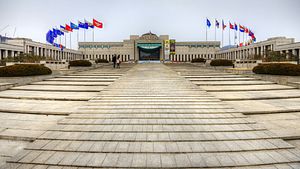This past year has seen tensions over history between Japan and South Korea running exceptionally high, with no end yet in sight. However, while Seoul continues to criticize Tokyo for its failure to come clean over its historical atrocities, South Korea struggles with history problems of its own.
Before and during the Korean War, the South Korean army and semi-official militias were responsible for massacres in which hundreds of thousands of civilians and political prisoners perished. Some work has been done under past governments to uncover the truth and restore the honor of the victims, but the memory of the massacres remains highly contentious and divisive. Many South Koreans do not even know they happened, and some deny they ever took place.
This history battle goes back to the period between liberation from Japanese rule and the start of the Korean War, when the Korean peninsula was a hotbed of political struggle. Before and during the war, hundreds of thousands of civilians and suspected communists were massacred by the South Korean army and anti-communist guerilla groups. In cases like the Jeju, Yeosu and Sunchon massacres, operations aimed at suppressing communist insurgents led to the deaths of thousands of civilians. In the largest case, the Bodo League Massacre, between 100,000 and 200,000 innocent people and suspected communist sympathizers were killed in an organized effort by the state.
For a long time, families of the victims kept silent out of fear as being branded as “reds” by the state if they spoke up. Under the rule of liberal president Roh Moo-hyun, a Truth and Reconciliation Commission was formed in 2005 despite heavy opposition from conservative groups and politicians. The commission gave many families official recognition by concluding that the death of their relative had indeed been unlawful.
However, many conservatives criticized the commission’s work, and saw it as a tool for political campaigning directed against them. In his book The War With Memory, Kim Dong-choon, one of the former commissioners, describes how conservative groups and media outlets consistently tried to undermine their efforts. The Lee Myung-bak administration disbanded the commission when its mandate expired in 2010, but many claim that much work still remains to be done.
“Little has happened since the [commission] disbanded, except that Presidents Lee and Park and their supporters pretend that none of this happened, not the investigation, not the massacres,” Bruce Cumings, professor of history at the University of Chicago told me in an email interview. As of this summer, victim’s families are still conducting excavations of mass graves from the massacres, on their own accord, without government support.
Despite the commission’s work, the massacres remain left out of much of the official historical narrative. Many South Koreans have barely even heard of the massacres, which are often excluded completely from school history lessons.
When visiting the Korean War Memorial Museum in Seoul this summer, I was unable to find even a single word about the massacres, in English or Korean. Events such as the Jeju and the Yeosu massacres are still described only in terms of communist rebellions that were quashed. Park Geun-hye’s former nominee for prime minister, Moon Chang-keuk, is among those who have claimed that the Jeju Massacre was merely a communist uprising.
These are only a few of many examples of how the memory of the massacres is distorted or denied. Choe Hung-san is the South Korea correspondent for New York Times. In 2000, he won a Pulitzer Prize for his uncovering of the No Gun Ri Massacre during the Korean War. He has long followed how the memory of the massacres is treated in South Korea, and paints a bleak picture when I meet him in Seoul.
“I think conservatives just wanted to shut down the commission, he says. I don’t think conservatives are willing to do more than pay lip service these days, and there have been attempts by conservative activists and newspapers to redefine the Jeju Massacre and other incidents. “
Even in the heyday of the formal reconciliation work, the commission’s findings never garnered much attention.
“It never really became a hot issue. Mainstream media didn’t pay much attention to the work of the commission, partly because the top mainstream newspapers are all conservative.”
For many in the older generation, says Choe, the massacres are still a vivid memory, but the younger generation doesn’t know much about them.
“History books don’t really teach young people about these ideologically sensitive issues, and there has been a systematic campaign by conservative scholars to stop so-called ‘progressive’ textbooks in schools. I don’t even think textbooks that ‘liberals’ approve of go into much depth about the massacres.”
Just as in the history debacle between Japan and Korea, textbooks are a focal point in South Korea’s history battles. In an email interview, former commissioner Kim Dong-choon agrees, and says that the report of the commission was never used to feed into textbooks used in schools. The Lee Myung-bak government, he claims, instead revised textbooks in the opposite direction, to include even less information about events such as the massacres.
Not much is likely to change in the future. It is easy for the South Korean government to push Japan to come clean over its past, because there, the Korean nation remains united. The memory of the massacres, on the other hand, divides the political right and left. Unlike the history conflict with Japan, there is virtually nothing to be gained politically by calling for investigations and reconciliation.
Those in the older generation who have direct memories of what happened are becoming fewer, and the younger generation, despite the massacres having figured in a number of popular movies and books, seems to care very little. In the case of the massacres, in contrast to the Japanese atrocities against Koreans, history will perhaps remain just history.
Benjamin Katzeff Silberstein is a Korea Studies MA candidate at Johns Hopkins School of Advanced International Studies.

































